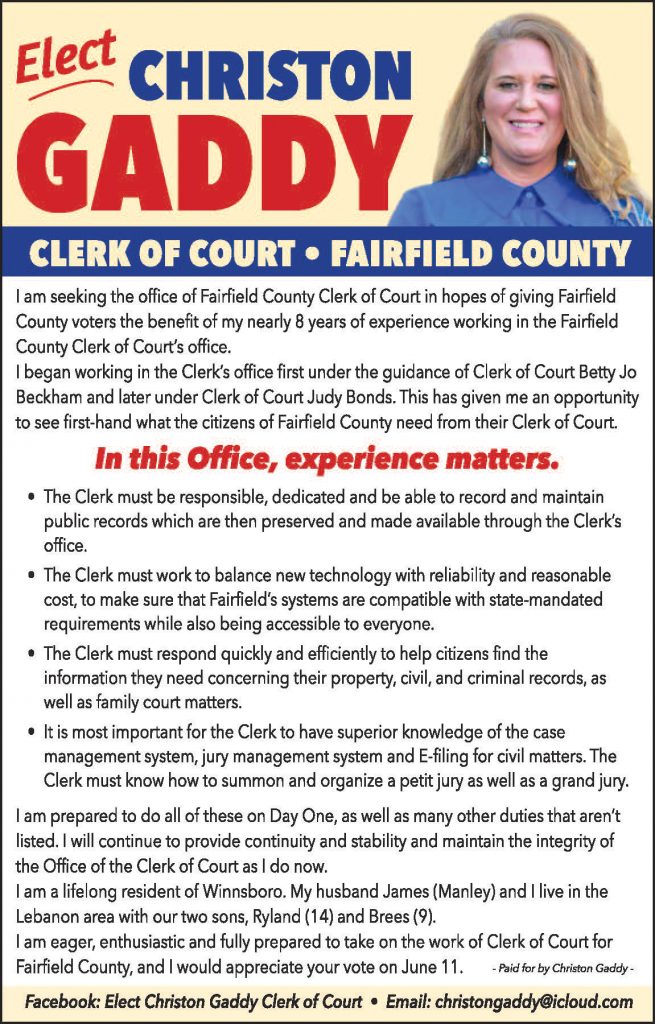BLYTHEWOOD – Residents along the east side of Rimer Pond Road in Blythewood received letters in the mail just before Christmas from the City of Columbia’s Department of Utilities and Engineering, asking for permission to survey their properties and take soil samples.
The letter, written by Hector Garcia, Right-of-Way Agent for the Department’s Real Estate Division, stated that the City of Columbia is planning what it calls improvements to the water system for the Town of Blythewood.
That ‘improvement,’ is a giant water line, 48-inches in diameter, aimed not at the Town of Blythewood, but toward private properties along the east side of Rimer Pond Road. The line will run from the water tower on Rimer Pond Road (at Highway 21), to Hardscrabble and eventually to the Kershaw County line.
The purpose of the proposed water line, according to Joey Jayco of Columbia’s Water and Engineering Department, is to improve water pressure and flow services to Northeast Columbia.
“It is also our intent to provide water service to the properties along Rimer Pond Road,” Jayco said.
Residents in the unincorporated areas of the county, like those on Rimer Pond Road, who agree to receive Columbia water are required to sign a water covenant agreeing to be annexed into the City of Columbia should their properties ever become contiguous with the city.
Some Rimer Pond Road residents who received the letter told The Voice that they plan to organize a group meeting of their neighbors to discuss the situation.
One resident, Gene Lee, said he would expect the City to send out a representative at some point to talk to the affected residents as a group.
For now, the letter received by the residents states, “a study is under way to determine the location of such improvements and, as part of the study, it is necessary to perform survey work and soil testing on a portion of the properties.”
The letter asks residents to sign and return the letter, giving written permission for the study to commence. Jayco said the Department has already received some responses to the letter.
Jayco said the surveyors must have written permission from a homeowner before they can go on a property to survey or test the soil.
Most of the homes and farms along the two roads are situated on large acreage properties. Their water is supplied from water wells on their properties.
Jayco said that once the surveying is completed by W. K. Dickson & Company, the contracted civil engineering firm, the City would determine where the line would be constructed, then begin acquiring easements from property owners.
Jayco said there was a possibility the line could be constructed on the other side of Rimer Pond Road, which has more open space and fewer homes.
“That will be decided after the survey work is finished,” he said.
Garcia, who was on vacation, could not be reached before press time, but Paxton Williams, another Right-of-Way Agent with Columbia’s Utilities and Engineering Department, said the water line would be constructed about 15-feet, more or less, inside the private property lines.
The letter to residents stated that, during the survey phase, “No trees will be cut or other physical damages inflicted to your property or its improvements.”
Once the City acquires the easements, however, Jayco said trees and other improvements in the acquired easements could be removed by the City. Jayco said he expected the entire survey and easement acquisition process to be completed in about a year.
Asked if the City would pay property owners for the easements, Jayco said the City would, in some circumstances, consider giving the residents a water tap as payment.
“With the addition of a tap,” Jayco said, “a property should increase in value. So the net return would be zero. It’s all a negotiation. If a tap is already there, we might pay the appraised value of the easement. It depends on the situation.”
Asked if residents would be able to continue to use their water wells if they accepted a tap from the City as payment for the easement, Jayco said the residents would be encouraged to use the tap water, but not required to.
John Litton, assistant Chief of the Bureau of Water at South Carolina’s Department of Health and Environment Control, said that, as far as he knew, residents with taps could continue to use the well water for any use, including drinking water.












